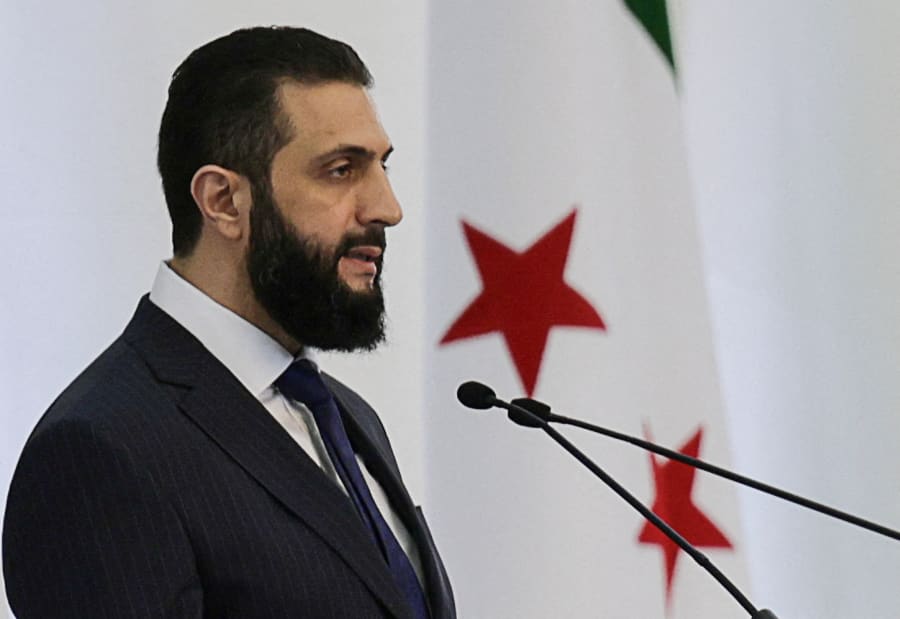US sanctions on Syria will be lifted, Trump set to meet Syrian President al-Sharaa
Israel’s FM says he wants ‘good relations’ but remains ‘skeptical’

U.S. President Donald Trump declared Tuesday that remaining sanctions against the country of Syria would be lifted, despite concerns over the former terror group Hay’at Tahrir al-Sham (HTS) that took over the government after the collapse of the Assad regime.
"After discussing the situation in Syria with the Crown Prince [Mohammed bin Salman] and also with President Erdogan of Turkey, who called me the other day and asked for a very similar thing ... I will be ordering the cessation of sanctions against Syria in order to give them a chance at greatness," Trump said during a speech in Saudi Arabia.
Trump said the "brutal and crippling" sanctions were necessary at the time but are no longer needed. "Now it is their time to shine. We are taking them all off. Good luck Syria. Show us something very special," he said.
A White House official also told the news outlet Axios: "The president agreed to say hello to the Syrian president while in Saudi Arabia tomorrow," confirming earlier reports of a meeting.
The war-torn country desperately needs sanctions relief to enable reconstruction, however, the background of the government that is dominated by HTS personnel, including the new president Ahmad al-Sharaa, as well as a spree of sectarian killings, has given some countries pause.
Israel has been among the most vocal countries expressing concerns about the need for caution.
However, in a possible sign that Israel’s policy could change amid increasing contacts by Western countries with Sharaa’s government, Foreign Minister Gideon Sa’ar said Sunday that Israel seeks good relations with its neighbor.
Asked whether Israel received assistance from the Syrian government during the recovery mission for Israeli soldier Tzvi Feldman, Sa’ar declined to answer but added: “However, we would like to have good relations.”
“We would like to have stability. We have, naturally, security concerns, and it is understood,” he added, acknowledging that Jerusalem has reason “to be skeptical with the current regime” particularly given “certain moves… with regard to minorities in the country.
“But our intentions are good,” Sa’ar emphasized. “We want it. We want security. We want stability. This is our wish.”
In previous comments criticizing attacks on Alawites and Druze in Syria, Sa’ar had called the new government “terrorists in suits,” and said they remained “Jihadists.”
Since then, however, Sharaa has been warmly received in France, and during this visit, revealed that there are indirect talks with Israel under mediation from the UAE with the goal of calming tensions.
According to a report by The Times, advisers to the U.S. president said the administration remains torn over its approach to Syria.
Sebastian Gorka, Trump’s counter-terrorism adviser, and Tulsi Gabbard, Trump’s director of national intelligence who met with former dictator Bashar al-Assad some years back, are said to be among the skeptics.
The rebuilding of Syria after a near total collapse of its economy and the complete destruction of its military, offers the rare opportunity for geo-strategic realignment of the country, which was historically one of the major cultural and economic powers in the region.
The Syrian government appears willing to join the U.S.-led, Western-friendly axis of Sunni powers in the region, which includes Saudi Arabia and Turkey.
Mouaz Moustafa, the director of the Washington-based Syrian Emergency Task Force, who recently met with al-Sharaa, told Axios that he intends to cooperate closely with the U.S. on counterterrorism, including the issue of remaining ISIS prisoners, and affirmed his committment to prevent a resurgence of Iranian influence in the country.
Both Moustafa and sources cited by Reuters reported that al-Sharaa also plans to pitch a strategic plan to Trump, which would include a potential agreement with Israel, and a Ukraine-style deal for U.S. access to Syria’s oil and gas reserves.
This could reportedly also include a telecoms contract for Syria for the U.S. provider AT&T, according to the Times, as well as major infrastructure projects.
Syria will also have to rebuild its military, which mainly consisted of old Soviet equipment, from scratch, potentially opening an opportunity for weapons sales.
The Trump administration is concerned that Syria could turn to China for several of these large projects: “Sharaa is looking east to China, but obviously we would like him to look west,” a source told the Times.
“If you look at how the Ukraine mineral deal was structured, that could be a template for Syria,” the source added.
“If Syria joins the Abraham Accords and the US uses that as leverage to bring them more to the West, that is a possibility and has been discussed.”

The All Israel News Staff is a team of journalists in Israel.












